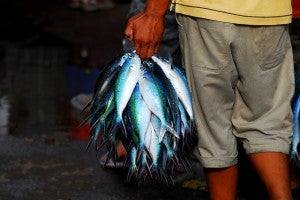
photo credit: tarotastic via photopin cc
Today is World Fisheries Day— a healthy reminder of how important fisheries are, regardless of where we live.
Wild fisheries must be managed and harvested sustainably in order to successfully rebuild global fish stocks and reliably feed the billions of people around the world who rely on them.
Innovative solutions are needed to establish sustainable fishing practices as the norm and to give a boost to coastal communities that rely on healthy fish stocks.
But today, global fisheries are tremendous pressure—to feed the world’s growing population and from the effects of climate change and ocean acidification. There is, however, cause for optimism. Here are 5 reasons why:
- In the United States, improved management—in part due to the flexibility and alignment of environmental, social and economic incentives that catch shares provide—is paying off. Fish stocks are rebuilding, fishermen are finding innovative solutions to be more selective about the stocks they target and the value of commercial seafood landed in 2012 was almost 20% higher than the average of the last decade. Fishermen are also seeing increased revenue per vessel. NMFS recently released an economic study of fisheries managed under quota allotments which found revenue increases of 27% in the first year and 68% after 10 years of the program. Read More.
- Earlier this year EDF examined successes from the United States and several other countries, such as Japan, Chile and Mexico, to assemble a comprehensive toolkit for designing and implementing management systems that can build resilient, profitable fisheries. This toolkit represents years of research and can deliver value to fishery managers around the world. Read More.
- After years of deliberation, the European Union has finalized proposals to reform the Common Fisheries Policy (CFP), the EU’s framework for fisheries management.The new policy promises a better future for both fishermen and fish by providing a comprehensive management system designed to restore healthy marine environments while supporting profitable fisheries and thriving coastal communities. The new CFP, which will enter into force in January, calls for Member States to move to eliminate the wasteful practice of discarding fish at sea. It also requires fishing at sustainable, Maximum Sustainable Yield (MSY) levels, and supports a regionalized approach through decentralized decision-making. Read More.
- EDF is a proud founding member of an ambitious effort with the World Bank and more than 100 partners to bring 50% of the world’s wild fish under sustainable management in 10 years while increasing economic benefits by $20 billion annually. This project represents impressive cooperation among countries, the private sector, NGOs and fishery stakeholders and can potentially transform the world’s fisheries and fishing communities. Read More.
- Many struggling or collapsed fisheries across the globe are already improving. The challenge is to replicate successful strategies and continue building partnerships with fishermen and other fishery stakeholders in the regions of the world where healthy fisheries are most essential. We are confident this can be achieved and will continue working to bring fishermen and managers together to find efficient, sustainable solutions that will work for both fish and fishermen. Read More.
We hope to have more progress to celebrate next year on World Fisheries Day.









